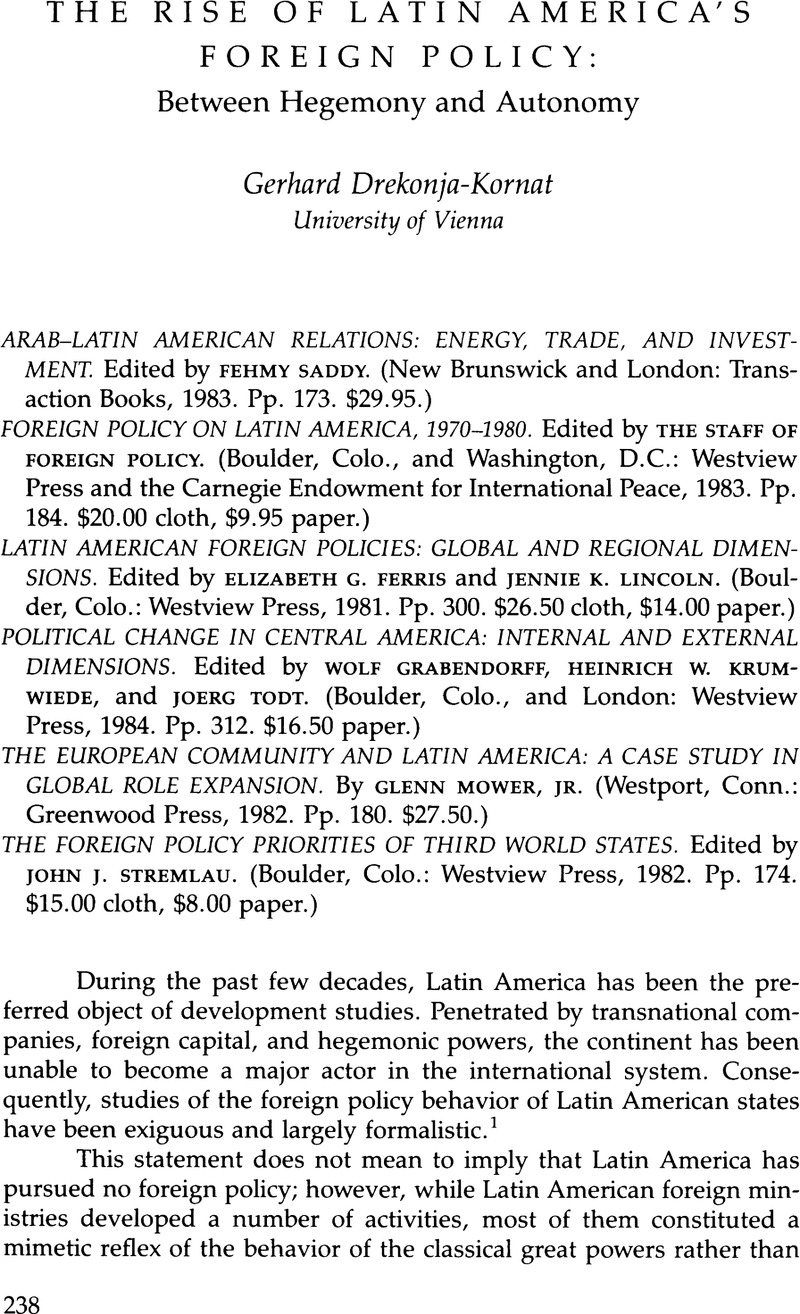Article contents
The Rise of Latin America's Foreign Policy: Between Hegemony and Autonomy
Review products
Published online by Cambridge University Press: 12 October 2022
Abstract

- Type
- Review Essays
- Information
- Copyright
- Copyright © 1986 by the University of Texas Press
References
Notes
1. Latin American Foreign Policies: An Analysis, edited by Harold Eugene Davis and Larman C. Wilson (Baltimore: Johns Hopkins University Press, 1975).
2. Constantino V. Vaitsos, “From a Colonial Past to Asymmetrical Interdependencies: The Role of Europe in North-South Relations,” in Europe's Role in World Development, edited by A. Mauri (Milan: Finafrica-Caprilo, 1981).
3. See, for example, Iris M. Laredo, Problemática de la solución de conflictos intrabloques: casos Guatemala, Hungría, Cuba, Santo Domingo, Checoeslovaquia (Buenos Aires: Editorial Depalma, 1970).
4. “Las relaciones internacionales de América Latina,” Foro Internacional 94 (Oct.–Dec. 1983).
5. See the journal Estudos Afro-Asiáticos, edited by Cândido José Mendes de Almeida and José Maria Nuñes Pereira, published by the Centro de Estudos Afro-Asiáticos at the Conjunto Universitário Cândido Mendes in Rio de Janeiro.
6. Heraldo Muñoz, “Los estudios internacionales en América Latina: problemas fundamentales,” Estudios Internacionales (Santiago de Chile) 13, no. 51 (1981):328–44.
7. Since 1984 RIAL has also published a journal entitled Semestres del RIAL in Buenos Aires under the aegis of the Grupo Editor Latinamericano.
8. The Dynamics of Latin American Foreign Policies: Challenges for the 1980s, edited by Jennie K. Lincoln and Elizabeth G. Ferris (Boulder, Colo., and London: Westview, 1984).
9. América Latina: políticas exteriores comparadas, edited by Juan Carlos Puig (Buenos Aires: Grupo Editor Latinoamericano, 1984). An Argentine colleague and I coedited a similar volume concentrating on theory as well as on the policies of individual countries (Cuba included). See Teoría y práctica de la política exterior latinoamericana, edited by Gerhard Drekonja and Juan G. Tokatlian (Bogotá: Centro de Estudios Internationales and Centro de Estudios de la Realidad Colombiana, 1983).
10. See Cuba y Estados Unidos: un debate para la convivencia, compiled by Juan G. Tokatlian (Buenos Aires: Grupo Editor Latinoamericano, 1984).
11. I ventured such a case study for Colombia. See Gerhard Drekonja-Kornat, Retos de la política exterior colombiana (Bogotá: Fondo Editorial Cerec, 1983). See especially the chapter “Un poco de teoría,” 197–210.
12. Harold K. Jacobson, Dusan Sidjanski, Jeffrey Rodamar, and Alice Hougassian-Rudovich, “Revolutionaries or Bargainers? Negotiators for a New International Order,” World Politics 35, no. 3 (1983):335–67.
13. América Latina, Europa Occidental y Estados Unidos: un nuevo Triángulo Atlántico? Compiled by Wolf Grabendorff and Riordan Roett (Buenos Aires: Grupo Editor Latinoamericano, 1984).
14. See Entre la autonomía y la subordinación: política exterior de los países latinoamericanos, compiled by Heraldo Muñoz and Joseph Tulchin (Buenos Aires: Grupo Editor Latinoamericano, 1984).
15. Abraham F. Lowenthal, “The United States and Latin America: Ending the Hegemonic Presumption,” Foreign Affairs 55, no. 1 (1976):199–213.
- 3
- Cited by




